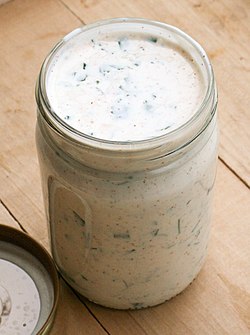Ranch dressing

Homemade ranch dressing
|
|
| Type | Salad dressing or dip |
|---|---|
| Place of origin | United States |
| Created by | Steve Henson |
| Invented | early 1950s |
| Main ingredients | buttermilk, onion, garlic, herbs |
| |
|
Ranch dressing is a type of salad dressing made of some combination of buttermilk, salt, garlic, onion, herbs (commonly chives, parsley, and dill), and spices (commonly black pepper, paprika, and ground mustard seed), mixed into a sauce based on mayonnaise or another oil emulsion. Sour cream and yogurt are sometimes used as a substitute by some home cooks or to create a lower-fat version. Ranch dressing has been the best-selling salad dressing in the United States since 1992, when it overtook Italian dressing. It is also popular as a dip.
In the early 1950s, Steve Henson developed what is now known as ranch dressing while working as a plumbing contractor for three years in the remote Alaskan bush. In 1954, he and his wife Gayle opened Hidden Valley Ranch, a dude ranch near Santa Barbara, California, where they served it to guests. It became popular, and they began selling it in packages for guests to take home, both as a finished product and as packets of seasoning to be mixed with mayonnaise and buttermilk. As demand grew, they incorporated Hidden Valley Ranch Food Products, Inc., and opened a factory to manufacture it in larger volumes, which they first distributed to supermarkets in the Southwest, and eventually, nationwide. In October 1972, the Hidden Valley Ranch brand was bought by Clorox for $8 million.
Kraft Foods and General Foods responded with similar dry seasoning packets labeled as "ranch style". As a result, they were both sued for trademark infringement by the Waples-Platter Companies, the Texas-based manufacturer of Ranch Style Beans (now part of ConAgra Foods), even though Waples-Platter had declined to enter the salad dressing market itself out of fear that the tendency of such products to spoil rapidly would damage its brand. The case was tried before federal judge Eldon Brooks Mahon in Fort Worth, Texas, in 1976. Judge Mahon ruled in favor of Waples-Platter in a lengthy opinion which described the various "ranch style" and "ranch" products then available, of which many had been created to compete against Hidden Valley Ranch. Judge Mahon specifically noted that Hidden Valley Ranch and Waples-Platter had no dispute with each other (though he also noted that Hidden Valley Ranch was simultaneously suing General Foods in a separate federal case in California). The only issue before the Texas federal district court was that Waples-Platter was disputing the right of other manufacturers to compete against Hidden Valley Ranch by using the label "ranch style".
...
Wikipedia
